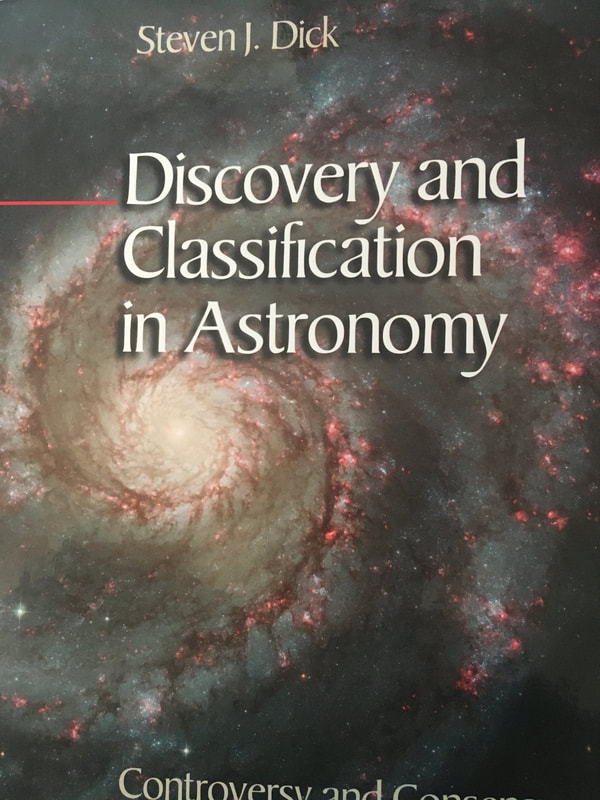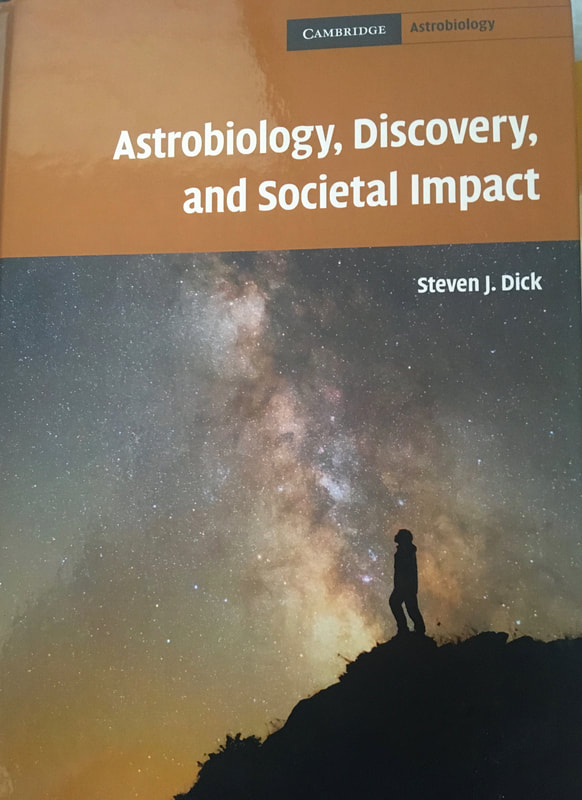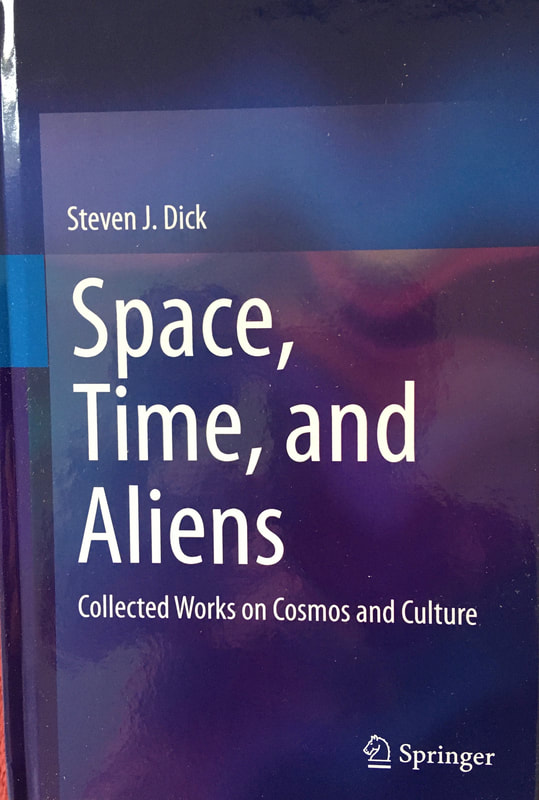Steven J Dick
Menu
BOOKS
1. Plurality of Worlds: The Origins of the Extraterrestrial Life Debate from Democritus to Kant (Cambridge University Press, 1982; paperback edition, 1984; French translation La pluralite des mondes , 1989). Reviewed in Isis, 74, no. 272 (1983), 268-70; American Historical Review (June, 1983), 647-48; Sky and Telescope (February, 1983), 139-40; Journal for the History of Astronomy, 14 (February, 1983); The Times Higher Education Supplement (July 16, 1982), and twelve other journals.
'Dick has performed a valuable service in compiling such an extensive survey of the historical development of the many worlds concept. An historical perspective on the subject provides a fascinating and important context for more modern advances.' New Scientist
2. Editor (with Leroy Doggett), Sky with Ocean Joined: Proceedings of the Sesquicentennial Symposia of the U. S. Naval Observatory, December 5 and 8, 1980 (U. S. Naval Observatory, 1983).
3. The Biological Universe: The Twentieth Century Extraterrestrial Life Debate and the Limits of Science (Cambridge University Press, May, 1996). Paper edition, Nov. 1999. Main Selection, Astronomy Book Club. Named by Britannica as one of the select books in 1996 making a significant contribution to knowledge in its field. Reviewed in Nature, 385 (1997), 592-93; Science, vol. 275, 21 March, 1997, 1748-49; Journal for History of Astronomy, 29 (1998), 88; Sky and Telescope (June, 1997), 62-63; Journal of British Astronomical Association 107 (1997), 96; The Observatory, 117 (1997), 102; Icarus, 127 (1997), 263; Irish Astronomical Journal, 24 (1997), 86; Mercury, 26 (1997), 32; New Scientist (14 Sept 1996), 43; and others.
"The Biological Universe is a wonderful and excellent read, containing a wealth of carefully researched material, and I wholeheartedly recommend it to the SETI enthusiast-- both amateur and professional alike." Julian A. Hiscox
"The best book on extraterrestrial life that I have ever read." Patrick Moore, New Scientist
"The book is well documented and offers a wealth of leads to a variety of literature, much of it otherwise difficult to find....Few other areas of science have such fine, reliable, convenient, and literate accounts of their history." Joseph N. Tatarewicz, Science
"...every reader should be grateful for a book that succeeds in enriching our knowledge of the historical and factual background needed for any serious discussion of these 'big questions.'" Stephen G. Brush, Nature
"Dick has produced the most thorough and thought-provoking book on this subject in years." Ben Bova, Mercury
"Dick's excellent book The Biological Universe, takes the reader through the historical and present debates over extraterrestrial life." Times Chronicle, Glenside News
"Dick has done and admirable job of opening up fresh territory....Dick's pioneering history nicely rounds out Cambridge University Press's trilogy on the extraterrestrial life debate." Karl Hufbauer, Isis
4. Life on Other Worlds The Twentieth Century Extraterrestrial Life Debate (abridgment and update of The Biological Universe), Cambridge University Press, 1998. Translations in Chinese, Italian, Polish, Czech and Greek. Reviewed in Astronomy and Geophysics(1999), 40; Journal for the History of Astronomy, 30 (1999), 409; Sky and Telescope (1999); etc.
"Amazingly comprehensive, as well as highly entertaining . . . I almost wish it would put an end to the outpouring of books on the subject; nothing more need be written, until the feared/long-hoped for moment of Revelation!" Sir Arthur C. Clarke
"Life on Other Worlds is a wondersome synthesis of scientific criticism, historical narrative, and socio-philosophical analysis of a theme that has captured the human imagination since the first stargazers." Joshua Lederberg, 1958 Nobel Prize in Physiology or Medicine
"...chapters on the search for planets outside our solar system, UFOs and the SETI project...pack a good deal of information and make skillful use of tables and figures...illustrations throughout." Publisher's Weekly
"One of the most exciting stories of the twentieth is the search, observational and theoretical, for evidence of extraterrestrial life. Steven Dick in his Life on Other Worlds has told that story with accuracy, clarity, and thoroughness. He is to be congratulated for this achievement, especially for the accessibility of his presentations and for the balance with which he has handled a history that at many points has been filled with controversy." Michael J. Crowe, University of Notre Dame
"...Steven Dick has written an intelligent and sober book." National Post
5. Editor (with Dennis McCarthy), Polar Motion: Historical and Scientific Problems, IAU Colloquium 178 (Astronomical Society of the Pacific, 2000)
6. Editor (with Alan Fiala), Proceedings of the Sesquicentennial Symposium of the American Nautical Almanac Office (U. S. Naval Observatory, 1999)
7. Editor, Many Worlds: The New Universe, Extraterrestrial Life and the Theological Implications (Templeton Press, 2000)
Description, Table of Contents, and sample chapters at Templeton Press
8. Sky and Ocean Joined: The U. S. Naval Observatory, 1830-2000 (Cambridge University Press, 2003). Reviewed in Technology and Culture [Robert Smith] January, 2005, 240-241, etc. Winner of the 2004 Pendelton Prize of the Society for History in the Federal Government, and the 2002 John Lyman Award of the North American Society for Oceanic History.
"...an historical tour-de-force, and I thoroughly recommend it to everyone interested in U.S. astronomical history, positional astronomy, national observatories, naval history, navigation, time-keeping, or the conflict involving civilian and military control of science." Journal of Astronomical History and Heritage
"It provides insight for scholars and general readers interested in naval history and navigation, timekeeping, positional astronomy, and celestial mechanics, and it charts the relationship between astronomy and astrophysics, the rise of national observatories and military patronage." Bulletin of Science Technology and Society
"An amazingly comprehensive and detailed history of the oldest major astronomical observatory in the United States, this excellent book offers mature readers fascinating stories of scientific discoveries (e.g. of the moons of Mars and Pluto), technological developments (e.g. from mechanical clocks working before there were any time zones to today's satellites that provide nanaosecond accuracies worldwide), and personal and political struggles (both governmental and institutional)." Science Books & Films
"Sky and Ocean Joined is quite well written and will certainly appeal to historians of science and technology, as well as naval enthusiasts, physicists, and anyone generally interested in astronomy." Stardust
"Extensively researched over 15 years, this book is well written and well documented with footnotes, select bibliographic essays, appendixes, and indexes. Recommended." Choice
"Sky and Ocean Joined is an outstanding book." Technology and Culture, Robert W. Smith
“A superlative piece of historical research … a volume that should be taken as both a model and an inspiration to all who follow.” The Antiquarian Astronomer, December, 2005.
9. (with James Strick), The Living Universe: NASA and the Development of Astrobiology (Rutgers U. Press, 2004)
The Living Universe is a comprehensive, historically nuanced study of the formation of the new scientific discipline of exobiology and its transformation into astrobiology. Among many other themes, the authors analyze how research on the origin of life became wedded to the search for life on other planets and for extraterrestrial intelligence. Many scientific breakthroughs of the last forty years were either directly supported or indirectly spun off from NASA’s exobiology program, including cell symbiosis, the discovery of the Archaea, and the theories of Nuclear Winter and the asteroid extinction of the dinosaurs.
Exobiology and astrobiology have generated public fascination, enormous public relations benefits for NASA, and––on the flip side of the coin––some of the most heated political wrangling ever seen in government science funding. Dick and Strick providea riveting overview of the search for life throughout the universe, with all of the Earthly complexities of a science-in-the-making and the imperfect humans called scientists. Their book will appeal to biologists, historians and philosophers of science, planetary scientists (including geologists), and an educated general readership interested in the investigation of life on other planets.
10. Editor (with Keith Cowing), Risk and Exploration: Earth, Sea and Stars (NASA SP-2005-4701 (Washington, D.C., 2005)
FULL TEXT at http://history.nasa.gov/SP-4701/riskandexploration.pdf
11. Editor (with Roger Launius), Critical Issues in the History of Spaceflight (NASA SP 4702 (Washington, D.C., 2006).
FULL TEXT at http://history.nasa.gov/SP-2006-4702/frontmatter.pdf
12. Editor (with Roger Launius), Societal Impact of Spaceflight (NASA SP 4801
(Washington, D.C., 2007)
FULL TEXT at http://history.nasa.gov/sp4801-part1.pdf and
http://history.nasa.gov/sp4801-part2.pdf
13. Editor (with Neil Armstrong et al.), America in Space: NASA’s First Fifty Years (Abrams: New York, 2007).
14. Editor, Remembering the Space Age (NASA SP- 2008-4703) FULL TEXT
http://history.nasa.gov/Remembering_Space_Age_A.pdf
http://history.nasa.gov/Remembering_Space_Age_B.pdf
http://history.nasa.gov/Remembering_Space_Age_C.pdf
15. Editor (with Mark Lupisella), Cosmos and Culture: Cultural Evolution in a Cosmic Context (NASA SP 2009-4802).
FULL TEXT at http://history.nasa.gov/SP-4802.pdf
16. Editor, NASA’s First 50 Years: Historical Perspectives (NASA SP 2010-4704).
FULL TEXT at https://history.nasa.gov/SP-4704.pdf
17. Editor, Historical Studies in the Societal Impact of Spaceflight (NASA, 2015) FULL TEXT at https://www.nasa.gov/sites/default/files/atoms/files/historical-studies-societal-impact-spaceflight-ebook_tagged.pdf
18. Editor (with Rebecca Wright and Sandra Johnson), NASA at 50: Interviews with NASA Senior Leadership (NASA SP-2012-4114)
FULL TEXT at https://www.nasa.gov/pdf/716218main_nasa_at_50-ebook.pdf
19. Discovery and Classification in Astronomy: Controversy and Consensus (Cambridge University Press, 2013).
"Overall, what Dick has given us is an excellent and comprehensive treatise on the science, history, philosophy, and sociology of discovery and classification in astronomy. There is much to take from Dick's work, both from the elaborate scientific details of the case studies and from the rich analyses of them from a synergetic science studies perspective." Philosophy of Science, 82, July 2015, 520-524
"Extraordinarily wide-ranging and detailed . . . An impressive work of synthesis, Dick's account ranges across the planetary, stellar and galactic realms, revealing humankind's dramatic transformation in understanding of the nature and structure of the universe since the Renaissance, whilst demonstrating the centrality of discovery and classification to that change." British Journal for the History of Science, 48 (March, 2015), 189-191.
"A highly accessible collection of narrative case studies that explore how the discipline of astronomy has gone about detecting new classes of phenomena and then has decided if, indeed, these new classes are in fact new, or whether they are actually variations or extremes of previously known classes. The bold ambition of the book, to craft a systematic hierarchical classification of all astronomical phenomena, to aid in forming and reforming taxonomies for future discoveries of new astronomical phenomena is, indeed, a goal that should be of great interest to scientists, historians, sociologists and philosophers."
David H. DeVorkin, National Air and Space Museum
"In challenging widely accepted ideas about the nature of scientific discovery, Steven J. Dick has written a bold and compelling book that will surely prove to be one of the most important works in the history of astronomy published in recent years. It is both an account of observational astronomy since the early seventeenth century as well as a deeply thought out and highly original investigation of the notions of discovery and classification in astronomy."
Robert Smith, University of Alberta
"Astronomy is an observational science so astronomers don't do experiments. They only observe, gather data, classify, interpret, define, and perhaps understand. Building on the foundation established by Martin Harwit more than thirty years ago, Steven J. Dick articulates a fascinating tale of discoveries, missed discoveries, and rediscoveries, explaining the unappreciated but nevertheless often significant role of luck, culture, sociology, and the importance of a firm and unambiguous recognized statement or claim of discovery. Discovery and Classification in Astronomy weaves the tortuous path between discovery and classification including the impact of recognizing or even merely defining or renaming celestial bodies or phenomena so vividly illustrated by the unexpected emotional public as well as professional controversy over the 2006 IAU reclassification which downgraded Pluto to a seemingly lowly 'dwarf planet' status."
Ken Kellermann, National Radio Astronomy Observatory
"... an excellent history of the development of modern astrophysics, illuminated by specific examples ... Highly recommended."
D. E. Hogg, Choice
"... an extraordinarily ambitious work by a renowned historian of astronomy ... a major resource to philosophers, historians and astronomers alike ... Dick's extensive system of classification ... is an extraordinary feat, a major contribution to the pedagogy of astronomy ..." Omar W. Nasim, Metascience
"Steven J. Dick, in this rich and enlightening book, attempts to bridge these realms of scientific practice and disciplinary work through a detailed analysis of one particularly intriguing category of discovery, that of astronomical objects ... Extraordinarily wide-ranging and detailed, [the] second part of the book provides a beautifully written, authoritative account of the non-mathematical facets of astronomical work since Galileo. An impressive work of synthesis, Dick's account ranges across the planetary, stellar and galactic realms, revealing humankind's dramatic transformation in understanding of the nature and structure of the universe since the Renaissance, whilst demonstrating the centrality of discovery and classification to that change." Joshua Nall, The British Journal for the History of Science
"... an intellectual banquet ... composed of different courses: first an introductory entrée, followed by a main course comprising historical narrative garnished with theory provided by the history of science, and then a dessert that looks at the the present and the future of astronomical discovery. It is masterfully written (as are all of Steven J. Dick's books), and is full of thought-provoking ideas and discussion. ... it is very well-priced, and should join the bookshelf of many astronomers - not just those committed to the history of astronomy." Wayne Orchiston, Journal of Astronomical History and Heritage
20. Editor, The Impact of Discovering Life Beyond Earth (Cambridge University Press, 2015).
Based on "Preparing for Discovery - NASA/Library of Congress Astrobiology Symposium, September 8-9, 2014." Video available at https://nai.nasa.gov/seminars/featured-seminar-channels/special-seminars/2014/9/18/nasalibrary-of-congress-astrobiology-symposium/
Response from NASA Apollo 14 astronaut Edgar Mitchell et al., at https://medium.com/the-foundation-for-research-into-extraterrestrial/an-open-letter-edit-by-dr-edgar-mitchell-and-others-79222e96e489
Related material at https://www.c-span.org/video/?321524-4/discussion-discovering-life-universe
https://www.youtube.com/watch?v=8FweCQJ80kc
21. Astrobiology, Discovery, and Societal Impact (Cambridge University Press, 2018). Winner of the PROSE Award in Astronomy and Cosmology from the Association of American Publishers.
At last, a comprehensive and level-headed analysis of what it means for humanity should we discover alien life - an event that would utterly transform our worldview. Steven J. Dick, the world's foremost scholar in this field, leads us from the lessons of history to the tantalizing promise of astrobiology's emerging technologies. Admirably, he does not shy away from confronting the ethical, societal and theological ramifications that most commentators fudge. This is a 'must-buy' book for anyone who thinks seriously about the age-old question of whether or not we alone in the universe.' Paul Davies, Arizona State University, and author of The Eerie Silence: Are We Alone in the Universe?
'We (primarily the space agencies and the scientific community of Astrobiology) are currently engaged in a grand exploration, seeking life beyond Earth. It is past time that we make plans for what the discovery of distant life - microbial, intelligent, or other - would mean for terrestrial life. What will be the impacts as we de-structure one set of world views and restructure another? What do we know about humans and their institutions that will help us plan proactively for a transition to a biological universe, if and when that occurs? What policies must we pre-enact to guide any first contact to an outcome deemed satisfactory by all concerned? These are just some of the questions posed by Steven J. Dick in this scholarly and fascinating book that makes the case for the further inclusion of the humanities and social sciences within Astrobiology. While many of these questions are now unanswerable, this work provides a roadmap for how we might arrive at what is knowable in advance of a discovery.' Jill Tarter, SETI Institute
22. Classifying the Cosmos: How We Can Make Sense of the Celestial Landscape (Springer, 2019).
"An important and revelatory work that can be used by researchers, educators, and enthusiasts alike." Physics Today, November, 2019.
23. Stardust Memories: A Dick Family History and Memoir (self published, 2019), available here https://repository.aip.org/islandora/object/nbla%3A287576.
24. Space, Time, and Aliens: Collected Works on Cosmos and Culture (Springer, 2020)
Web Hosting by iPage





